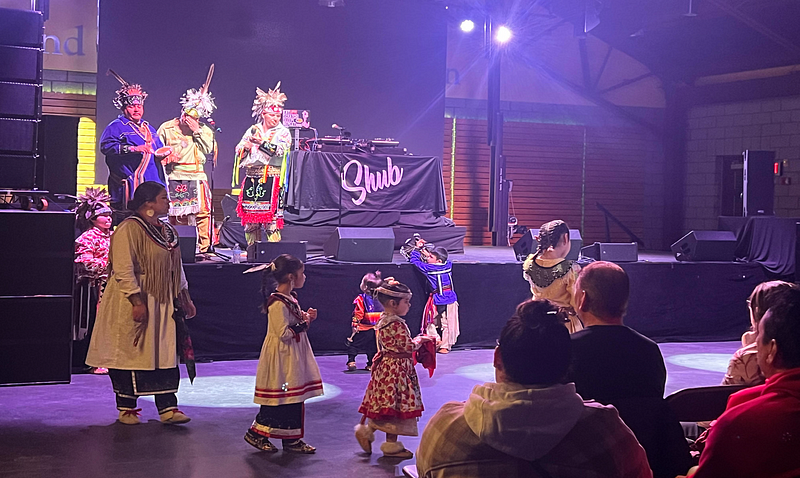
DJ Shub has managed to intertwine his culture with the mainstream appeal of his music in a way that is distinct and notable. Photo courtesy of Lily Rizzoli ‘24.
On Friday, Feb. 23, Hamilton conducted the latest installment in the Tolles Lecture series. Dan Generals, also known by his stage name DJ Shub, held an engaging discussion with students and faculty in the Events Barn.
Internationally renowned as a producer, DJ Shub’s artistry blends his Six Nations native tradition with current popular music trends. Shub is a former member of A Tribe Called Red (now The Halluci Nation), an eclectic music group which pioneered the “pow-wow step” genre. Also known as “electric pow-wow,” this style is a complex mixture of many different musical disciplines. Trap, EDM and Dancehall influences are united by the evocative power of Indigenous music. Flanked by an entourage of collaborators, Shub conducted an informal discussion of his music and prolific career.
The seminar began with a screening of “Indomitable,” a 2017 music video for DJ Shub’s song of the same name. The video portrays an urban office worker escaping from a dreary city and traveling to a vibrant pow-wow. The song, which features hard hitting synths and bass-drops, is both electric and anthemic. Shub described the theme of the song in detail: “living off reserve, like me and my family do… you miss your culture, in the video you see him bogged down by work and the urban environment…you are always a stone’s throw away from your culture…you can return to it.” Even if you are geographically distant from your native culture, Shub argues that the culture within you is something worth celebrating and sharing.
This was followed by a screening of “War Club,” a 2020 music video for Shub’s collaboration with Snotty Nose Rez Kids. The animated visualizer featured breathtaking imagery, which ranged from the politically charged to the psychedelic. Shub explained that this song was largely written in response to the instability plaguing the Six Nations of Great River at that time; a fishing rights dispute, coupled with private encroachment on reservation lands, sparked Shub’s creative passion. “War Club” is both sonically pleasing and socially conscious.
Lastly, the discussion opened up to a question-and-answer format. Questions ranged from stylistic influences to institutional criticism. Shub noted how pow-wow step emerged as “the music I waited my whole life to hear, but I didn’t know where it was.” He recalled how festival atmosphere was a major influence on electric pow-wow, giving him an avenue to blend his experience as a DJ with his own tradition and culture. This influence has led to friction with Six Nations leaders, who endorse the broad appeal of his music, but denounce the hedonism implicit in clubbing culture. Shub advised the audience to place their own personal culture in their music; in a society where we consume heaps of information on the hour, unique cultures offer a means of standing out amongst other musicians. These thoughts were bracketed by discussions of sociological issues. For instance, Shub’s associate Dan explained how land reparations offer the start to a conversation about racial prejudice, as opposed to concrete plans for social rejuvenation. These reparations logistically cannot be enacted but open our minds to progressive concepts. DJ Shub concluded the evening by underscoring the truest purpose of his music: To have fun. “Dancing is the most important thing…bring the energy. Music is energy. Let loose and have a good time.”